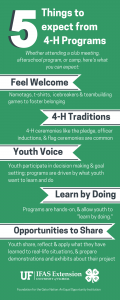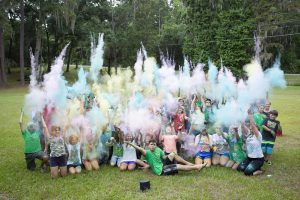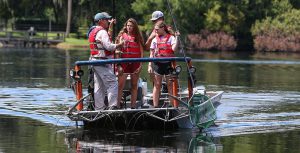4-H offers one of the most dynamic youth development experiences- not only are there different types of 4-H membership, but also a wide spectrum of topics youth can explore. This post will break down the types of 4-H membership, topics youth can learn about, and what to expect during a 4-H club meeting.
4-H Membership Types
- Community and project clubs are the most traditional membership. Community clubs serve specific geographic areas and offer a wide variety of projects. Project clubs focus on one specific project area, such as sewing, horses, or robotics.
- 4-H also partners with schools and afterschool programs to provide 4-H experiences for youth. Check with your child’s school or afterschool provider to find out what is available. 4-H also offers some in-school programs like public speaking, agriculture awareness, and embryology to teach science career development.
- Youth can also participate as camp members. Most counties offer day and residential camp experiences.
- Some youth also participate in special interest projects or events. This could include Teen Retreat, judging teams, 4-H Legislature, or workshops.
4-H offers multiple ways for youth to explore their sparks. We have three pillar programs- Science, Technology, Engineering, and Math (STEM), Healthy Living, and Citizenship and Leadership. You can find out more about each of the projects by clicking the links below.
STEM |
Healthy Living |
Citizenship & Leadership |
|
Beef |
Public Speaking | |
| Community Service | ||
| Citizenship | ||
What to Expect during a 4-H Program
- A Sense of Belonging– Icebreakers, teambuilding, and get-to-know you games are intentionally part of 4-H programs to help youth (especially new youth) feel like they belong and are welcome. Read more about making meetings welcoming…
- 4-H Ceremonies are part of our culture- most 4-H programs begin with the pledge to the American and 4-H flags. Annually, we have officer inductions for our youth club and council offers. For many of our overnight events (such as camp) we will also have flag ceremonies.
- Youth~adult partnerships– we view youth as resources. That means that youth voice is important, and youth are encouraged to participate in decision making and goal setting. Club programs are driven by what youth want to learn and do through 4-H, and meetings are led by youth officers.
- Opportunities to Learn– educational programs and workshops are taught by adult and teen volunteers. Programs are hands-on, and allow youth to “learn by doing.”
- Opportunities to share– 4-H uses the experiential learning model, meaning that volunteers ask questions to help youth reflect and process what they have learned, and how it will help them in future situations. Sometimes youth will give demonstrations or presentations about their project work- especially when they are preparing for a completion.
For more information about 4-H club meetings, check out these previous articles:
- Making Meetings Fun (and more manageable)
- Making Meetings Welcoming
- Three Dysfunctions of a 4-H Meeting
Enrollment for the 2021-2022 4-H year opens August 20th. For more information about opportunities for youth and volunteers in your area, contact your local UF IFAS Extension Office.
- Meet our Summer Intern- Andy Franklin! - June 13, 2025
- Blue Ribbon Baked Goods - September 23, 2024
- Blue Ribbon Photos and Posters - September 21, 2024


